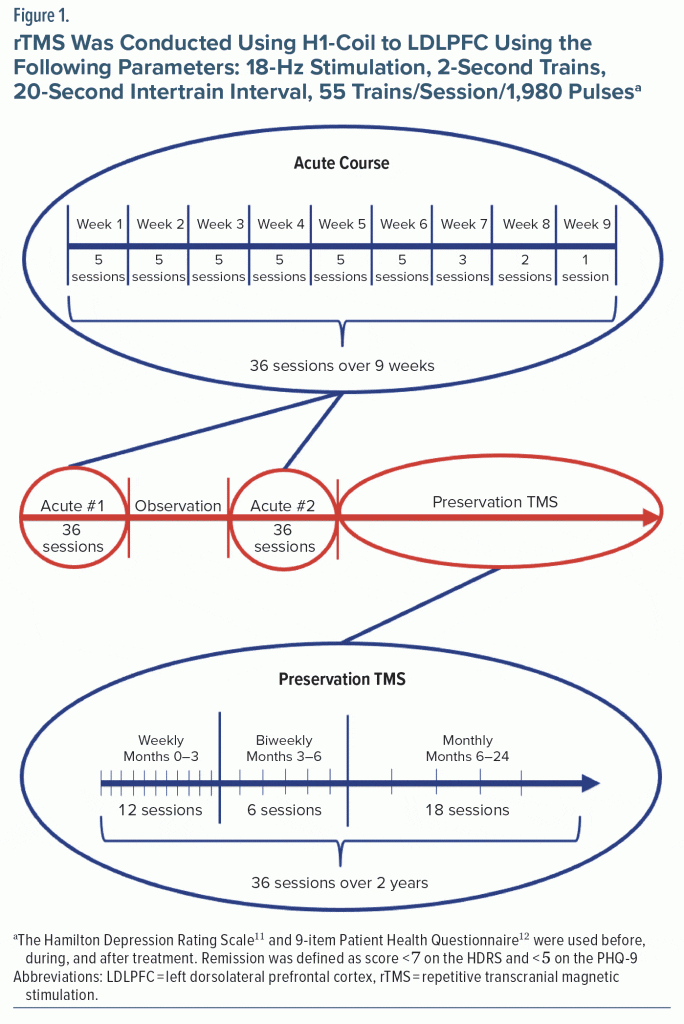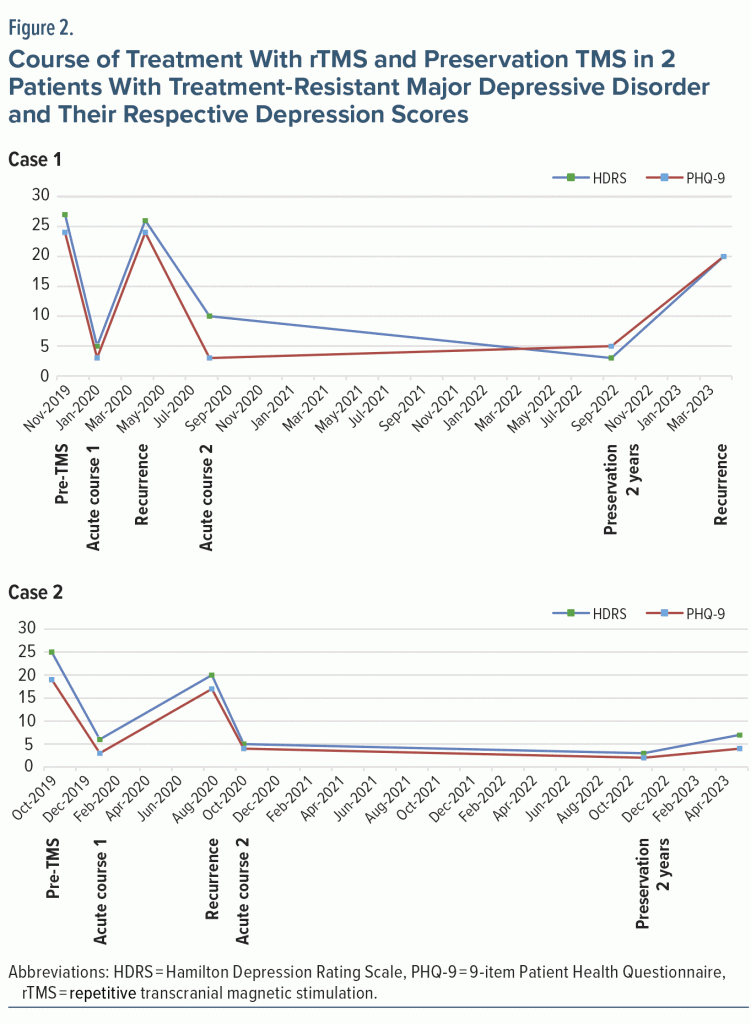Repetitive transcranial magnetic stimulation (rTMS) is effective in the treatment of major depressive disorder (MDD),1–5 but benefits are often not durable.6,7 MDD is a chronic and recurrent disorder, and phases in its management should include acute, continuation, and maintenance.8,9 Preservation TMS is defined as rTMS treatments used to sustain a clinical response after a successful acute course. The optimal strategy for this treatment is not established. Unfortunately, in current practice the usual course of action after achieving remission is to discontinue treatment due to lack of reimbursement.
Research on preservation TMS is limited10 due to variable protocols, short durations, and lack of controls. Most rTMS research is concentrated on new indications and optimizing the acute course (location, coils, protocols) and not on maintaining benefits. More studies of preservation rTMS are critically needed.
Here, we present 2 cases of treatment-resistant MDD in which remission was achieved with an acute course of rTMS, but symptoms recurred upon discontinuation. Implementing preservation TMS in these patients has led to a significant extension to their remission status. The methods and design of the study are illustrated in Figure 1.
Case 1
A 39-year-old woman with treatment-resistant MDD was prescribed an acute course of rTMS. At the end of the acute course, remission was achieved, rTMS was discontinued, and the patient was monitored for recurrence of depression. Three months after stopping rTMS, symptoms of depression returned. Upon recurrence, a second acute course of rTMS using the same parameters was prescribed, again leading to remission after finishing the full course. Following the second acute course, we prescribed preservation rTMS with the following schedule: once a week for 3 months, then every other week for 3 months, and monthly thereafter for 18 months, totaling 36 sessions over 2 years. The patient was still in remission from depressive symptoms at the end of the 2-year period, demonstrating significant prolongation of remission compared to the first treatment when no preservation TMS was done.
Case 2
A 61-year-old man with treatment-resistant MDD was prescribed an acute course of rTMS using the same parameters as in case 1. Just like in case 1, at the end of the acute course, remission was achieved based on depression scale scores. rTMS was discontinued, and the patient was monitored. Depression recurred 6 months after the last rTMS session. He was treated with a second acute course of rTMS using the same parameters, which again led to remission. Similar to case 1, preservation TMS was initiated with the same protocol. At the end of the 2-year period, the patient remained in remission, again demonstrating sustained rTMS effect with preservation TMS.
Discussion
At the end of 2 years, patient 1 opted to discontinue rTMS, while patient 2 chose to continue. There was a recurrence of depression in case 1 in 6 months, whereas the patient from case 2 continued to maintain well-being with scores in the remission range (Figure 2).
There were no medication changes throughout the treatment. Neither of the patients required rescue treatments during the 2-year maintenance. No safety issues were identified throughout the treatment.
These cases clearly demonstrate utility of preservation TMS in patients who achieve remission from an acute rTMS course. We provide a unique look at how remission can be preserved over a very long duration using scheduled treatments with progressively increasing intervals. Preservation TMS is cost-effective, as the number of sessions needed for 2 years is the same as that needed for every acute course. Our cases illustrate the benefit of continuing treatment beyond 2 years to preserve clinical response.
More studies on preservation TMS are needed. Comparing rTMS discontinuation to preservation TMS within the same patient is advantageous, thus minimizing variables while analyzing the outcomes.
Article Information
Published Online: December 14, 2023. https://doi.org/10.4088/PCC.23cr03575
© 2023 Physicians Postgraduate Press, Inc.
Prim Care Companion CNS Disord 2023;25(6):23cr03575
Submitted: June 6, 2023; accepted September 7, 2023.
To Cite: Faruqui Z, Mania I, Gigilashvili M, et al. Long-term preservation transcranial magnetic stimulation for major depressive disorder. Prim Care Companion CNS Disord. 2023;25(6):23cr03575.
Author Affiliations: Drexel University College of Medicine, Philadelphia, Pennsylvania (Faruqui); Keystone Behavioral Health, Chambersburg, Pennsylvania (Mania); Tbilisi Mental Health Center, Georgia (Gigilashvili); Georgian Association for Mental Health, Tbilisi, Georgia (Akubardia).
Corresponding Author: Zeeshan Faruqui, MD, FAPA, Drexel University College of Medicine, Keystone Behavioral Health, 110 Chambers Hill Dr, Chambersburg, PA 17201 ([email protected]).
Relevant Financial Relationships: None.
Funding/Support: None.
Patient Consent: Consent was received from the patients to publish the cases, and information has been de-identified to protect anonymity.
References (12)

- O’Reardon JP, Solvason HB, Janicak PG, et al. Efficacy and safety of transcranial magnetic stimulation in the acute treatment of major depression: a multisite randomized controlled trial. Biol Psychiatry. 2007;62(11):1208–1216. PubMed CrossRef
- Levkovitz Y, Isserles M, Padberg F, et al. Efficacy and safety of deep transcranial magnetic stimulation for major depression: a prospective multicenter randomized controlled trial. World Psychiatry. 2015;14(1):64–73. PubMed CrossRef
- Blumberger DM, Vila-Rodriguez F, Thorpe KE, et al. Effectiveness of theta burst versus high-frequency repetitive transcranial magnetic stimulation in patients with depression (THREE-D): a randomized non-inferiority trial. Lancet. 2018;391(10131):1683–1692. PubMed CrossRef
- Slotema CW, Blom JD, Hoek HW, et al. Should we expand the toolbox of psychiatric treatment methods to include repetitive transcranial magnetic stimulation (rTMS)? a meta-analysis of the efficacy of rTMS in psychiatric disorders. J Clin Psychiatry. 2010;71(7):873–884. PubMed CrossRef
- Gaynes BN, Lloyd SW, Lux L, et al. Repetitive transcranial magnetic stimulation for treatment-resistant depression: a systematic review and meta-analysis. J Clin Psychiatry. 2014;75(5):477–489, quiz 489. PubMed CrossRef
- Janicak PG, Nahas Z, Lisanby SH, et al. Durability of clinical benefit with transcranial magnetic stimulation (TMS) in the treatment of pharmacoresistant major depression: assessment of relapse during a 6-month, multisite, open-label study. Brain Stimul. 2010;3(4):187–199. PubMed CrossRef
- Cohen RB, Boggio PS, Fregni F. Risk factors for relapse after remission with repetitive transcranial magnetic stimulation for the treatment of depression. Depress Anxiety. 2009;26(7):682–688. PubMed CrossRef
- Frank E, Prien RF, Jarrett RB, et al. Conceptualization and rationale for consensus definitions of terms in major depressive disorder. Remission, recovery, relapse, and recurrence. Arch Gen Psychiatry. 1991;48(9):851–855. PubMed CrossRef
- Sackeim HA. Acute continuation and maintenance treatment of major depressive episodes with transcranial magnetic stimulation. Brain Stimul. 2016;9(3):313–319. PubMed CrossRef
- Wilson S, Croarkin PE, Aaronson ST, et al. Systematic review of preservation TMS that includes continuation, maintenance, relapse-prevention, and rescue TMS. J Affect Disord. 2022;296:79–88. PubMed CrossRef
- Hamilton M. A rating scale for depression. J Neurol Neurosurg Psychiatry. 1960;23(1):56–62. PubMed CrossRef
- Kroenke K, Spitzer RL, Williams JB. The PHQ-9: validity of a brief depression severity measure. J Gen Intern Med. 2001;16(9):606–613. PubMed CrossRef
Please sign in or purchase this PDF for $40.
Save
Cite





